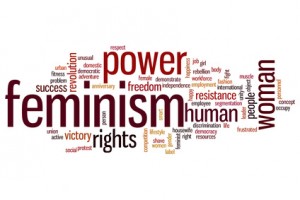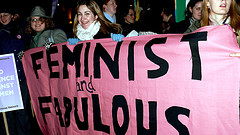Yet another actress has made headlines by denying that she’s a feminist. This time it is Kaley Cuoco-Sweeting, an actress on The Big Bang Theory, who told Redbook that she “was never that feminist girl demanding equality, but maybe that’s because I’ve never really faced inequality.” Leaving aside the truth of that statement (she’s either clueless or in denial) and her quick retraction on Instagram, I have to admit that I’m tired of overpaid entertainers stealing the spotlight on feminism.
Frankly, I don’t care what Ms. Cucoco-Sweeting, Shailene Woodley or Taylor Swift think about  feminism (although I am glad that Taylor has since come around). They’re all young and, if they don’t get it soon, they will as they get older. I’m sure they’ve never stopped to ask themselves just why it is that interviewers keep asking women – but not men – that question. Could it be that they are trying to stir up controversy and make women view each other in divisive ways? Or is it that men who do not actively support women’s equality aren’t newsworthy? I also wonder how many times reporters have asked whether a person is a feminist and then not included the answer of “yes” into the story.
feminism (although I am glad that Taylor has since come around). They’re all young and, if they don’t get it soon, they will as they get older. I’m sure they’ve never stopped to ask themselves just why it is that interviewers keep asking women – but not men – that question. Could it be that they are trying to stir up controversy and make women view each other in divisive ways? Or is it that men who do not actively support women’s equality aren’t newsworthy? I also wonder how many times reporters have asked whether a person is a feminist and then not included the answer of “yes” into the story.
Regardless of their reasons for doing so, I wish the mainstream media would stop asking the “are you a feminist?” question of actresses and singers because it’s just silly. Money and fame have insulated them to some degree and, perhaps even more importantly, they have audiences and bosses to placate. I’m sure many of them remember the derision and scorn actress Katherine Heigl faced after saying that her movie Knocked Up was “a little sexist.” It was, in fact, a lot sexist but that’s neither here nor there. Plus, such an emphasis on entertainers leads to ignoring women who are doing things that may truly make a difference.
Just within the last few years, some truly remarkable women have very visible as they try to change the way our country is being run. There are the women on the front lines of the labor movement (Dolores Huerta of the United Farm Workers; Karen Lewis, president of Chicago Teacher’s Union; Mary Kay Henry, international president of the SEIU), those leading environmental protests (biologist Sandra Steingraber, activist Julia Hill) and women offering direct challenges to religion (Sister Simone Campbell, executive director of NETWORK, a National Catholic Social Justice Lobby). Where are the articles in Redbook on them? Where are the in-depth interviews with these women on how they became involved in their respective movements, what sacrifices they’ve had to make as a result of their activism and what hopes they have for the future? But no, despite these women being fascinating people and influential leaders, we rarely hear about them.
Or how about feature articles on loud and proud feminists, women who proudly wear the label and incorporate the movement into their work? Where are the interviews with women like Anita Hill (a lawyer who took on Clarence Thomas and fights for social justice issues), Jessica Valenti (founder of the feministing website), Wagatwe Wanjuki (who has used her experience with sexual assault as an impetus to end sexual violence on college campuses), bell hooks (an author who has written over 30 books, many of them on feminism), Joan Williams (lawyer and founder of the WorkLifeLaw Institute that works on parenting issues), Anita Sarkeesian (who has taken on sexism in the gaming community), or Ellie Smeal (founder of the Feminist Majority Foundation)? I’m pretty sure all of these women – and many others – have fascinating stories to tell.
I can already hear the questions being asked about this. Aren’t interviews with entertainers what women truly want to read? Why does it matter if we have more articles on influential and feminist women? First, it’s pretty sexist to assume that women’s reading tastes are so superficial that we aren’t interested in substantive features and articles. Of course, with all the magazines for women focused mostly on fashion, dieting and entertainment, when would we ever get the chance to know if we’re interested in those things or not? When I taught at a primarily women’s university, I counted no less than 10 different types of wedding magazines sold in the campus bookstore and it was a fight to get them to carry Ms. Magazine. I literally had to insist upon it as part of one of my courses. And if you visit a physician’s office, I challenge you to find magazines for women with “serious” articles.
Second, articles on influential and feminist women do matter. Quite a bit, in fact. The need for it is part of something called the Serengeti strategy. In the Serengeti, predators focus on animals that are isolated or off to the side of the herd because they are easier to attack. The same holds true for individuals who are fighting for various causes. If they’re alone in their battle, they are easier to harass, even assault. Thus, the best way to fight back against those threatening, challenging, and demeaning members of demonized groups (like feminists) is for more group members to be visible and loud. The more faces to match with an idea, the harder it is for people to make one individual stand for the whole. For example, if Anita Sarkeesian is the only one challenging sexism in the gaming community, then it is easy to attack her personally to try and subvert or ignore her message. However, if there are more feminists joining her – especially if they are well-known (like actress Felicia Day) – then it is more difficult to say sexism in gaming is the opinion of just one person.
Similarly, it is important for women and young girls in particular to know that there are women out there who are accomplishing goals and fighting for their rights. If they see and hear about these women who are making a difference, who do not let the standard conventions of what women “should” do stand in their way, then they too can dream about and work toward becoming something more than a pretty face. Wouldn’t that be something? It might even be enough that the question “Are you a feminist?” would stop being asked because reporters and interviewers would know that the answer would be an enthusiastic and unqualified, “YES!”

